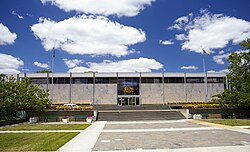| Supreme Court of the Australian Capital Territory | |
|---|---|
 Arms of the City of Canberra, as used by the court | |
 ACT Law Courts building | |
 | |
| 35°16′52″S 149°07′38″E / 35.281015°S 149.127245°E | |
| Established | 1 January 1934 |
| Jurisdiction | |
| Location | London Circuit at Canberra |
| Coordinates | 35°16′52″S 149°07′38″E / 35.281015°S 149.127245°E |
| Composition method | Executive appointment following advice of the Attorney-General |
| Authorised by | |
| Appeals to | High Court of Australia |
| Appeals from | Magistrates Court of the ACT |
| Judge term length | Mandatory retirement by age of 70 |
| Number of positions | 5 |
| Website | www.courts.act.gov.au/supreme |
| Chief Justice of the Australian Capital Territory | |
| Currently | Lucy McCallum |
| Since | 8 March 2022 |
The Supreme Court of the Australian Capital Territory is the highest court of the Australian Capital Territory (ACT). It has unlimited jurisdiction within the territory in civil matters and hears the most serious criminal matters.
The court has the jurisdictional power to hear matters that relate to the Jervis Bay Territory, the Australian Antarctic Territory and the Heard Island and McDonald Islands, although it has never heard a case exercising its power over the Heard and McDonald Islands.[1] It also hears matters on appeal from the Magistrates Court of the Australian Capital Territory.
Whilst the Supreme Court is the highest Australian Capital Territory court in the Australian court hierarchy, an appeal by special leave can be made to the High Court of Australia. Matters of appeal can also be submitted to the ACT Court of Appeal, which is constituted by members of the Supreme Court.
The Supreme Court consists of 5 permanent judges, including the chief justice of the Australian Capital Territory (as of 2022[update], Lucy McCallum), 1 associate judge, 11 additional judges and 4 acting judges. The court has three main administrative units: Registry, Sheriff's Office and the Russell Fox Library.[2]
The court is located on Knowles Place near London Circuit at Civic, in Canberra, in the new ACT Law Courts building that it shares with the Magistrates Court.
- ^ "Court Jurisdiction and History". ACT Supreme Court. ACT Government. July 2016. Archived from the original on 20 February 2017. Retrieved 31 July 2016.
- ^ Cite error: The named reference
:0was invoked but never defined (see the help page).